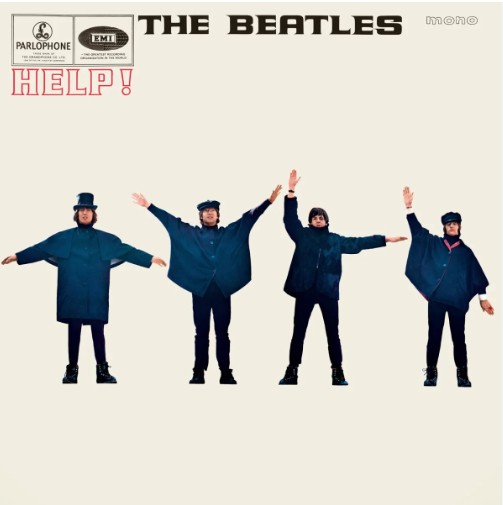Sixty Years Later The Beatles’ Fifth Album Remains A Milestone in Music and Culture

On August 6, 1965, The Beatles released their fifth studio album, Help!, a pivotal moment in their career that bridged their early pop exuberance with the introspective artistry of their later work. As we celebrate its 60th anniversary in 2025, Help! remains a cultural touchstone, blending infectious melodies, innovative songwriting, and a cinematic legacy that continues to resonate with fans and musicians alike. It’s well worth taking some time to explore the creation, history, and enduring relevance of Help!, an album that captured a band in transition and left an indelible mark on music history.
Creation of Help!
The Help! album was born during a whirlwind period for The Beatles, who were at the peak of Beatlemania. Recorded between February and June 1965 at EMI Studios (now Abbey Road Studios) in London, the album was produced by George Martin, whose knack for translating the band’s vision into polished recordings was crucial. Unlike their earlier albums, which were often rushed to capitalize on their fame, Help! reflected a maturing songwriting duo in John Lennon and Paul McCartney, with contributions from George Harrison and Ringo Starr adding depth.
The album was tied to The Beatles’ second feature film, Help!, a comedic adventure directed by Richard Lester. Seven of its 14 tracks (12 in the U.S. version) appeared in the film, with the remaining tracks filling out the UK release. The recording process was intense, with sessions squeezed between a grueling tour schedule and filming in locations like the Bahamas and Austria. Lennon later admitted to feeling overwhelmed, telling Rolling Stone in 1970, “I was fat and depressed, and I was crying out for help.” This personal turmoil fueled the title track, a raw plea for support disguised in upbeat pop.
Help! showcased The Beatles’ growing musical sophistication. Lennon’s “You’ve Got to Hide Your Love Away” introduced folk influences inspired by Bob Dylan, featuring acoustic guitar and flutes. McCartney’s “Yesterday,” recorded with a string quartet, became one of the most covered songs in history, marking a leap in emotional depth. Harrison’s “I Need You” was his first significant songwriting contribution, hinting at his emerging voice. The album also included rockers like “The Night Before” and “Ticket to Ride,” the latter praised by Lennon as “one of the earliest heavy metal records” for its driving rhythm.
Technological innovation played a role too. The band experimented with double-tracking vocals and guitars, and Martin’s production incorporated subtle overdubs, like the tambourine on “Ticket to Ride.” The U.S. version, released on August 13, 1965, by Capitol Records, differed significantly, featuring orchestral interludes from the film score by Ken Thorne, which diluted the rock focus but added cinematic flair.
Historical Context and Impact
Help! arrived at a turning point for The Beatles and the 1960s. By 1965, the band had conquered America with their Ed Sullivan Show appearances and A Hard Day’s Night (1964). However, Beatlemania’s frenzy—screaming fans, relentless media scrutiny—was taking its toll. The Help! film, while commercially successful, was less critically acclaimed than A Hard Day’s Night, with its surreal plot reflecting the band’s exhaustion. Yet the album transcended these pressures, showcasing their evolution from teen idols to serious artists.
The album’s lyrical content marked a significant shift. Lennon’s introspective songs, like “Help!” and “You’re Going to Lose That Girl,” hinted at personal struggles, while McCartney’s “I’ve Just Seen a Face” blended folk and country influences. The inclusion of covers like “Act Naturally” (sung by Starr) and “Dizzy Miss Lizzy” nodded to their rock ‘n’ roll roots but would be among their last, as original compositions took precedence. Help! peaked at No. 1 in both the UK and U.S., selling over 1 million copies in the UK alone by 1966, and its singles—“Help!” and “Roll Over Beethoven” (in some markets)—dominated charts.
Help! also influenced the music industry. Its blend of pop, rock, and folk inspired contemporaries like The Byrds and The Rolling Stones to experiment with genre boundaries. The album’s production techniques, particularly on “Yesterday,” set a precedent for orchestral pop, influencing bands from The Beach Boys to Radiohead. The film’s playful visuals and humor shaped music videos, with scenes like the band skiing in “Ticket to Ride” becoming iconic.
Relevance Today
Sixty years later, Help! remains a cornerstone of The Beatles’ legacy and a touchstone for modern music and culture. Its songs are timeless, with “Yesterday” covered by artists from Frank Sinatra to Billie Eilish, amassing over 2,200 versions by 2025. The title track’s raw honesty resonates with mental health discussions, its lyrics reflecting universal themes of vulnerability. Posts on X in 2025 highlight its enduring appeal, with fans sharing, “Still get chills from Lennon’s voice on ‘Help!’—pure emotion” and “McCartney’s ‘Yesterday’ is eternal.”
The album’s influence extends to contemporary artists. Indie bands like Tame Impala and Vampire Weekend cite its melodic clarity and experimental spirit. The Help! film, restored in 4K in 2013, is celebrated for its proto-MTV aesthetic, influencing directors like Wes Anderson. Musicologists, like those cited in Journal of Popular Music Studies (2023), note that Help! marked The Beatles’ shift toward albums as cohesive artistic statements, paving the way for Rubber Soul and Revolver.
In 2025, the 60th anniversary has sparked renewed interest. Record stores report a surge in Help! vinyl sales, with a limited-edition reissue featuring outtakes like an unreleased “Ticket to Ride” demo climbing the charts. Streaming platforms like Spotify show millions of monthly streams for “Yesterday” and “Help!,” while fan communities on Reddit (r/beatles) share rare photos from the 1965 sessions. Tributes include a BBC Radio 2 special and a Liverpool exhibition at The Beatles Story museum, showcasing artifacts like Lennon’s handwritten lyrics.
Help! also speaks to today’s cultural conversations. Its themes of seeking help and navigating fame resonate in an era of mental health awareness and celebrity scrutiny. The album’s diversity—spanning rock, folk, and pop—mirrors the genre fluidity of modern music. For new listeners, it’s an accessible entry to The Beatles’ catalog, while for longtime fans, it’s a reminder of their transformative power.
As we mark the 60th anniversary of Help!, The Beatles’ fifth album remains a testament to their creative evolution and cultural impact. Born from the chaos of Beatlemania, it captured a band grappling with fame while pushing musical boundaries. Its songs, from the plaintive “Yesterday” to the urgent “Help!,” continue to inspire, with their emotional depth and innovation echoing in today’s music. Whether through vinyl reissues, streaming, or fan tributes on X, Help! endures as a vibrant piece of history, proving that The Beatles’ cry for help in 1965 still connects with hearts in 2025.




